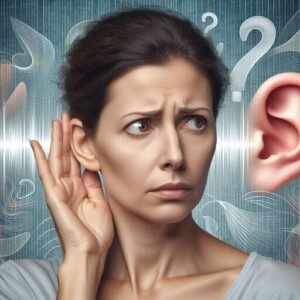A study says how well you “hear” in a noisy environment could be more about your level of intelligence rather than your sense of hearing.
Imagine trying to chat with a friend in a noisy cafe. The espresso machine hisses, dishes clatter, people are loudly talking, maybe there’s music overhead.
And you’re nodding along, hoping you caught what your friend just said.
It’s easy to assume your ears are to blame, especially since a typical hearing test will include testing how well you can hear tones through earphones with noise in the background.
Research now says it might have more to do with how your brain processes sound rather than how well the nerve cells in your ears pick up soundwaves and transmit them to the brain.
How IQ Affects Listening in Noise
A team of researchers explored how people with different thinking abilities handle conversations in noisy environments. The three groups studied were:
- Neurotypical people
- Autistic people
- People with fetal alcohol syndrome (various impairments resulting from the mother drinking during pregnancy)
Everyone in the study had normal hearing, but their ability to follow speech in background noise varied based on IQ — regardless of neurotypical, autistic or FAS diagnosis.
“The relationship between cognitive ability and speech-perception performance transcended diagnostic categories,” points out Bonnie Lau in the paper, published in PLOS One (2025).
She’s a research assistant professor of otolaryngology/head and neck surgery at University of Washington School of Medicine.
Although the study had fewer than 50 participants, Dr. Lau says the pattern linked higher intellectual ability to better speech understanding in noisy places.
It didn’t matter if that higher intellect was in someone neurotypical, someone autistic or someone with FAS.
She emphasizes that this doesn’t mean intelligence is the only factor — just one important aspect. Listening in real-world settings, like classrooms or parties, involves more than just your ears.
Why were people with ASD and FAS in the study?
Both groups are known to struggle in noisy environments despite normal hearing.
- Most people with FAS have IQs in the intellectually disabled or “slow learner” range; some may have IQs above average as well.
- People with autism can have a wide range of IQs, from low to genius level.
For the study there were 12 participants with autism, 10 with fetal alcohol syndrome and 27 who were neurotypical, all between 13 and 47 years old.
The “Multi-Talker” Test
Each participant first passed a hearing screening before moving on to a computer-based task known as the “multitalker” test. Here, they listened to one main male speaker while two other voices talked over him.
The goal was to focus on the target speaker and ignore the others. Each voice said a phrase like “Ready, eagle, go to green five now,” and participants had to select the correct color and number on the screen.
As the test went on, the background chatter got louder — simulating the chaos of a crowded diner or auditorium. Afterward, subjects took standardized IQ tests measuring verbal, nonverbal and reasoning abilities.
Researchers then compared these results with how well each person performed on the multi-talker test.
Fascinating Results
Smarter people, as measured by IQ, were better listeners. The team found a strong connection between intellectual ability and how well participants could understand speech amid noise, regardless of whether they were neurotypical or neurodivergent.
Listening Is a Brain Workout
According to Dr. Lau, following speech in a noisy place involves far more than hearing. She explains that one must separate different voices, then home in on the voice you care most about.
The others then need to be blocked out to decipher what that most important voice is saying.
The listener must identify words, decode sounds and process meaning, while reading nonverbal body language.
That’s a lot of brain juice for even a superficial conversation.
When It’s Not About Hearing Loss
This research also challenges the idea that difficulty hearing in loud settings automatically means hearing loss. The paper says one need not have hearing impairment to experience trouble understanding speech in a noisy coffee shop.
These findings may also be somewhat demoralizing: Next time you’re in a noisy place and you’re having difficulty understanding your friend’s speech – you now might find yourself wondering about your intelligence rather than hearing!
On the other hand, if your educational level and career are indicative of high intellect, you’ll also want to consider the possibility that maybe you have hearing loss.
Nevertheless, this study suggests that “bad hearing” isn’t always about your cochlea’s neurons.










































